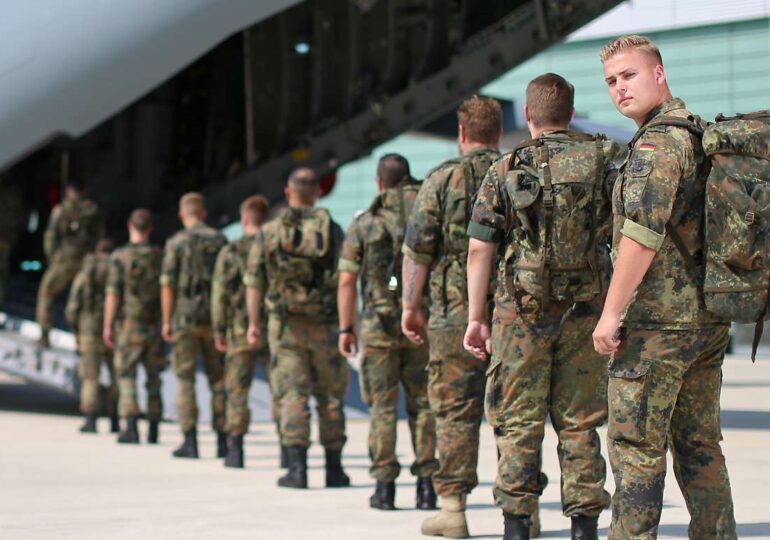As the number of German soldiers stagnates and the threat from Russia grows stronger, Berlin is betting on a voluntary service model to rebuild the army. But time is running out, and the pressure is mounting.
Germany wants a stronger army, but it lacks soldiers, writes Politico.
The future government, formed by the conservative Christian Democrats of Friedrich Merz and the center-left Social Democrats (SPD), has launched a coalition agreement that presents a plan for a new voluntary military service aimed at rebuilding the dwindling ranks of Germany's armed forces, the Bundeswehr.
The plan involves sending a mandatory questionnaire to all 18-year-old men – voluntary for women – with the aim of assessing the willingness and aptitude of civilians to serve in the military. Those selected will be invited to enlist if they so desire.
Defense Minister Boris Pistorius, an SPD politician expected to retain his position in the new government, has defended this approach, considering it a forward-looking, pragmatic step.
"With a new military service, we will ensure both the growth and the sustainability of the armed forces. We are making the Bundeswehr more attractive," he said at a meeting of the Ukraine Defense Contact Group in Brussels last week.
But without clear evidence of how many people would enroll in the plan, a warning light has already been lit in Germany's defense circles.
"If basic military service fails to significantly motivate more young people to volunteer for the armed forces in the near future, the Bundeswehr will remain below the necessary number of active soldiers and trained reserves," said Christian Richter, a reserve lieutenant colonel and legal expert at the German Institute for Defense and Strategic Studies, a think tank within the Bundeswehr.
"This would jeopardize Germany's defense capability - both in terms of national defense and collective defense within NATO. These two cannot be separated," he said.
A Thinning Army in Constant Decline
The Bundeswehr is already a thinning army. The ranks have decreased to approximately 182,000 people. More have left the army than joined last year, and nearly a third of new recruits have dropped out of training, according to the government's annual analysis of the Bundeswehr's condition.
It is a challenge rooted not only in recruitment numbers but also in decades of political decisions that have marginalized the army.
Following a radical reduction after the Cold War in 1994 under Chancellor Helmut Kohl, military bases were closed, especially those in cities. And with that, according to Carlo Masala, a professor at the Bundeswehr University in Munich and military advisor, the army disappeared from public life. "Their bases today are in the middle of nowhere. There is no direct contact for young people," he said.
This distancing has deepened in recent years.
In 2011, conscription was abolished. In 2018, the Bundeswehr recruitment campaign at the Gamescom convention in Cologne sparked reactions to a poster that read "Multiplayer at its best," a message aimed at young people, referencing video games.
Critics accused the army of trivializing war and targeting adolescents. "Disgusting. Trying to lure clueless players into weapons," a user posted on X.
Earlier this year, the eastern city of Zwickau banned Bundeswehr advertisements in public spaces, self-proclaiming as a "city of peace" – although the municipal supervisory authority later found the decision to be illegal.
Against this backdrop of blurred visibility and political hesitancy, Germany is now betting on a new voluntary military service.
Objective for a Russian Attack
"We need these additional 100,000 soldiers immediately and as soon as possible," said General Carsten Breuer, Germany's senior military commander, at a meeting of the German Council on Foreign Relations last week.
The broader, long-term goal is much larger. "Germany's current need is for 460,000 soldiers," Breuer said. The number includes active forces, reservists, and former soldiers whom Germany must be able to call upon in a major crisis.
And that crisis may not be far off. According to Masala, 2029 has become Germany's informal deadline. It is the year when NATO and German intelligence services expect Russia to have rebuilt enough conventional military capacity after the exhausting war in Ukraine to threaten allied territory.
"This is the planning horizon we are working with. If Germany waits until the new infrastructure is ready, it may already be too late," Masala said.
The secret operations plan through which Germany is preparing for war with Russia
To bridge the gap, the future coalition is betting on a volunteer-based military service, loosely modeled after the Swedish Totalförsvar system, meaning "Total Defense."
Christian Richter believes that the plan to rely on volunteers rather than a draft is a political compromise, one that buys time but not much.
"That's why the coalition agreement included a compromise stating that the new military service will be 'initially voluntary.' But given the scenarios discussed, including a possible Russian attack on NATO territory as early as 2029, we don't have much time," he said.
T.D.

